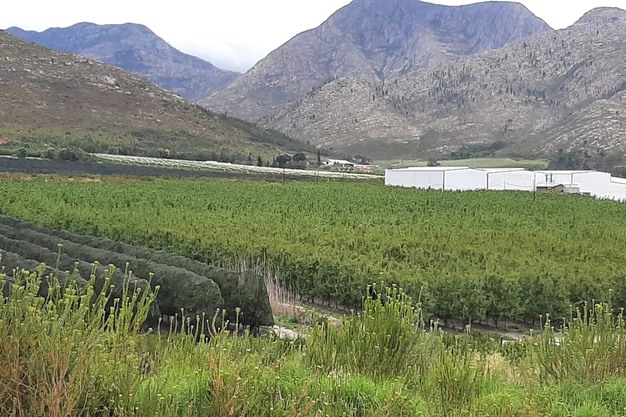The most recent cut-off low weather system moving across South Africa left behind between 100mm and around 200mm over two days in the Langkloof, but apart from gullies formed on slopes, no damage has been reported from the apple and pear orchards. More rain is predicted for next week and the downstream Kouga Dam in the citrus-producing Gamtoos Valley is again overflowing yesterday after years of being barely 10% full.

Orchards with "wet feet" in slow-draining orchards and those in full bloom are most vulnerable to infection by disease after the heavy rains. Preventing the fungus causing apple scab from taking hold is a springtime priority in the Langkloof's topfruit orchards.
"On the spraying side most blocks are at the three quarters flower drop and beyond, and the critical period to spray against fusi [apple scab fungus] is completed. It was fairly wet over the past three weeks, with a high fusi index, and producers have been spraying once or twice weekly to reduce the risk," explains Johan Kotze of Dutoit Agri in the Langkloof.
There is very low tolerance for apple scab and sending such apples to a juicing factory won't even cover production costs.

Apple fruit set disappoints
A normal crop is expected from the Langkloof's Abate Fetel, Forelle and early BC (Williams) pear orchards, he says, and on Packhams it's still a bit early to come to any firm conclusions: during the coming month, Packhams traditionally abscise fruit: the period of the 'November drop'. A reliable estimate will only be possible thereafter, but a normal Packham crop remains a possibility.
Langkloof apples are roughly pea-sized at the moment. "The fruit set on apples wasn't quite what we're used to, and the flowering on many cultivars ran over a really extended period. The potential fruit set seems to be on the lower end, and the apple crop could be reduced, but it's still very early."![]() For more information:
For more information:
Johan Kotze
Dutoit Agri
https://www.dutoitagri.co.za/
